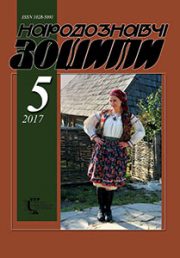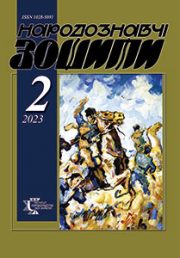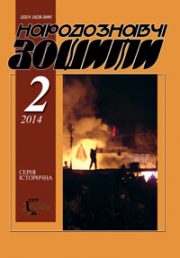The Ethnology Notebooks. 2017, 2 (134), 395—399
UDK 35: 639.1(477) «18/19»
DOI https://doi.org/10.15407/nz2017.02.395
THE HISTORY OF HUNTING EDUCATION AT GALICIA in late xix — early xx century
Protsiv Oleg Romanovich, Ph.D. in Public Administration,
Chief Specialist
of Ivano-Frankivsk Regional Department of Forestry and Hunting.
Mykhajla Hrushevs’koho Street, 31, 76000, Ivano-Frankivs’k, Ukraine.
Contacts: e-mail: oleg1965@meta.ua
Abstract. the state regulation and law enforcement of hunting education at Galicia in late XIX — early XX century are highlighted. The analysis of methods of teaching for subjects, rules of entry to educational institutions, laws of students behavior while studying is realized in the article. Humanitarian, political, economical factors, which affected on the form and quality of education, are revealed.
Keywords: Galicia, hunting, studying, education.
Received 25.12.2016
REFERENCES
Protsiv, O.R. (2010). Z istorii diial’nosti Stanislavivs’koho myslyvs’koho instytutu. Naukovyj visnyk NLTU: zbirnyk naukovo-tekhnichnykh prats’, 20.14, 352—357 [in Ukrainian].
Alegaty do sprawozdań stenograficznych drugiej sesyi ósmego periodu Sejmu Krajowego Królestwa Galicyi i Lodomeryi z Wielkim Księstwem Krakowskiem z roku 1873. (1873). Lwów [in Polish].
Dziennik ustaw państwa dla królestw i krajów w radzie państwa reprezentowanych. (1893). Wiedeń [in Polish].
Krogulski, S. (1929). Pół wieku: Zarys działalności Małopolskiego towarzystwa łowieckiego 1876—1926. Lwów: Małopolskie towarzystwo łowieckie [in Polish].
O stosunkach łowieckich w Galicyi. (1909). In Łowiec Wielkopolski. ( Vol 17, pp. 296—299) [in Polish].
O założenie akademii lasowej w kraju. (1912). In Sylwan. (Vol 2, pp. 43) [in Polish].
Obwieszenie. (1904). In Sylwan. (Vol. 4, pp. 103—104) [in Polish].
Ogłoszenia. (1908). In Sylwan. (Vol. 1, pp. 136) [in Polish].
Prywatna szkoła łowiecka. (1929). In Łowiec Polski. (Vol. 19, pp. 325) [in Polish].
Rożyński, F. (1921). Schechtel Ekonomiczne znaczenie łowiectwa dla naszego kraju. Warzsawa: Nakładem polskiego towarzystwa łowieckeigo [in Polish].
Sprawozdania statystyczne za miesiąc Styczeń 1911. (1911). Kraków: Biuro statystyczne [in Polish].
Sprawozdania statystyczne za miesiąc Styczeń 1925. (1925). Kraków: Biuro statystyczne [in Polish].
Sprawozdanie stenograficzne z Walnego zgromadzenia galic. Towarzystwa łowieckiego z dnia 14. pażdziernika 1882 (1882). In Łowiec. (Vol.11) [in Polish].
Sprawy galic. towaryzstwa łowieckiego. (1882). In Łowiec. (Vol. 11, pp. 161) [in Polish].
Starkl, J. & Fiszer, Z. (1896). Powszechna wystawa krajowa 1894 r. i siły produkcyjne kraju: Łowiectwo i rybactwo. Lwów: Wydział krajowy [in Polish].
Szkoły rolnicze i nauka rybactwa. (1893). In Okólnik. (Vol 7, p. 8) [in Polish].
Ukrajowienie lasóv państwowych. (1908). In Sylwan. (Vol. 8—9, p. 192) [in Polish].
Ukrajowienie lasów paṅstwowych. (1912). In Sylwan. (Vol. 11, p. 268) [in Polish].
W sprawie oczyszczenia języka łowieckiego. (1910). In Łowiec (Vol. 4, pp. 40—41) [in Polish].
Wyżcza szkoła lasowa we Lwowie. (1910). In Łowiec. (Vol 17, p. 207) [in Polish].
Ze statystyki łowieckiej. (1904). In Łowiec. (Vol 23, p. 296) [in Polish].






